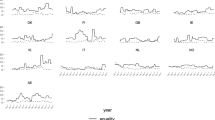Abstract
This paper considers the effect of political liberal principles on the children in society. Specifically, the paper argues that political liberalism faces a problem where parents or other adults want to pass on bizarre or dangerous beliefs to their offspring. This problem arises because in the political liberal framework the only limit on what doctrines a child may acquire is that the child becomes a reasonable citizen. Since this criterion is designed to be lax, this implies children may justly be inculcated with views that may undermine their welfare in later life. This presents political liberals with a dilemma. Ensuring that children are taught appropriate views requires narrowing the scope of political liberal principles, whilst keeping the broad focus of political liberalism brings with it unpalatable consequences when we consider the next generation.
Similar content being viewed by others
Notes
By non-political, I mean all those aspects of education which are not relevant to the inculcation of the sense of justice, a settled desire to act in accordance with the principles of justice.
A recent example of this is the case of Areni Manuelyan, who died because of a chest infection induced by malnutrition. Areni had been raised on a purely fruitarian diet. http://news.bbc.co.uk/1/hi/health/1542293.stm.
An important counter to my argument at this point would be to suggest that the wider purposes of political liberalism will be sufficient to protect children from the possible dangers of learning certain beliefs. This is an influential view within the literature and is held by theorists such as Eamonn Callan (1997) and Amy Gutmann (1995). If correct, this would undercut my argument as adduced. In reply, I argue that while political liberalism does indeed have implications for the character of certain views, these implications are much less significant than is often thought. As such, many views might still survive in a political liberal state which face the problems outlined in this paper. My arguments against Callan and Gutmann are made at length in Fowler (2011)
References
BBC News. 2001. Baby death parents spared jail. http://news.bbc.co.uk/1/hi/health/1542293.stm. Accessed on 01/06/09.
Callan, Eamonn. 1997. Creating citizens. Oxford: Oxford University Press.
Clayton, Matthew. 2006. Justice and legitimacy in upbringing. Oxford: Oxford University Press.
Fowler, Timothy. 2011. The limits of civic education. Theory and Research in Education.
Gutmann, Amy. 1995. Civic education and social diversity. Ethics 105: 557–579.
Hannan, Sarah, and Richard Vernon. 2008. Parental rights: A role based approach. Theory and Research in Education 6(2): 173–189.
Kelly, Erin, and Lionel McPherson. 2001. On tolerating the unreasonable. The Journal of Political Philosophy 9(1): 38–55.
Lecce, Steven. 2008. Against perfectionism: Defending liberal neutrality. Toronto: University of Toronto Press.
Rawls, John. 1993. Political liberalism. New York: Columbia University Press.
Swift, Adam, and Harry Brighouse. 2009. Legitimate parental partiality. Philosophy & Public Affairs 37(1): 43–80.
Acknowledgments
This research forms part of a PhD project, generously funded by the University of York. My final year of the PhD was supported by a grant from the Philosophy of Education Society of Great Britain, whose contribution made this work possible. I’d like to thank my supervisors Matt Matravers and Sue Mendus, as well as all the participants at the York theory workshop. A version of this paper was presented at a conference at the University of Manchester as well as reading group at the University of Wisconsin-Madison, and I’d like to thank everyone who offered helpful advice at both of those events. Finally, I’d like to express my gratitude to Harry Brighouse, discussions with whom clarified many of the ideas in this paper and indeed the rest of my thesis.
Author information
Authors and Affiliations
Corresponding author
Rights and permissions
About this article
Cite this article
Fowler, T.M. The Problems of Liberal Neutrality in Upbringing. Res Publica 16, 367–381 (2010). https://doi.org/10.1007/s11158-010-9132-0
Published:
Issue Date:
DOI: https://doi.org/10.1007/s11158-010-9132-0




